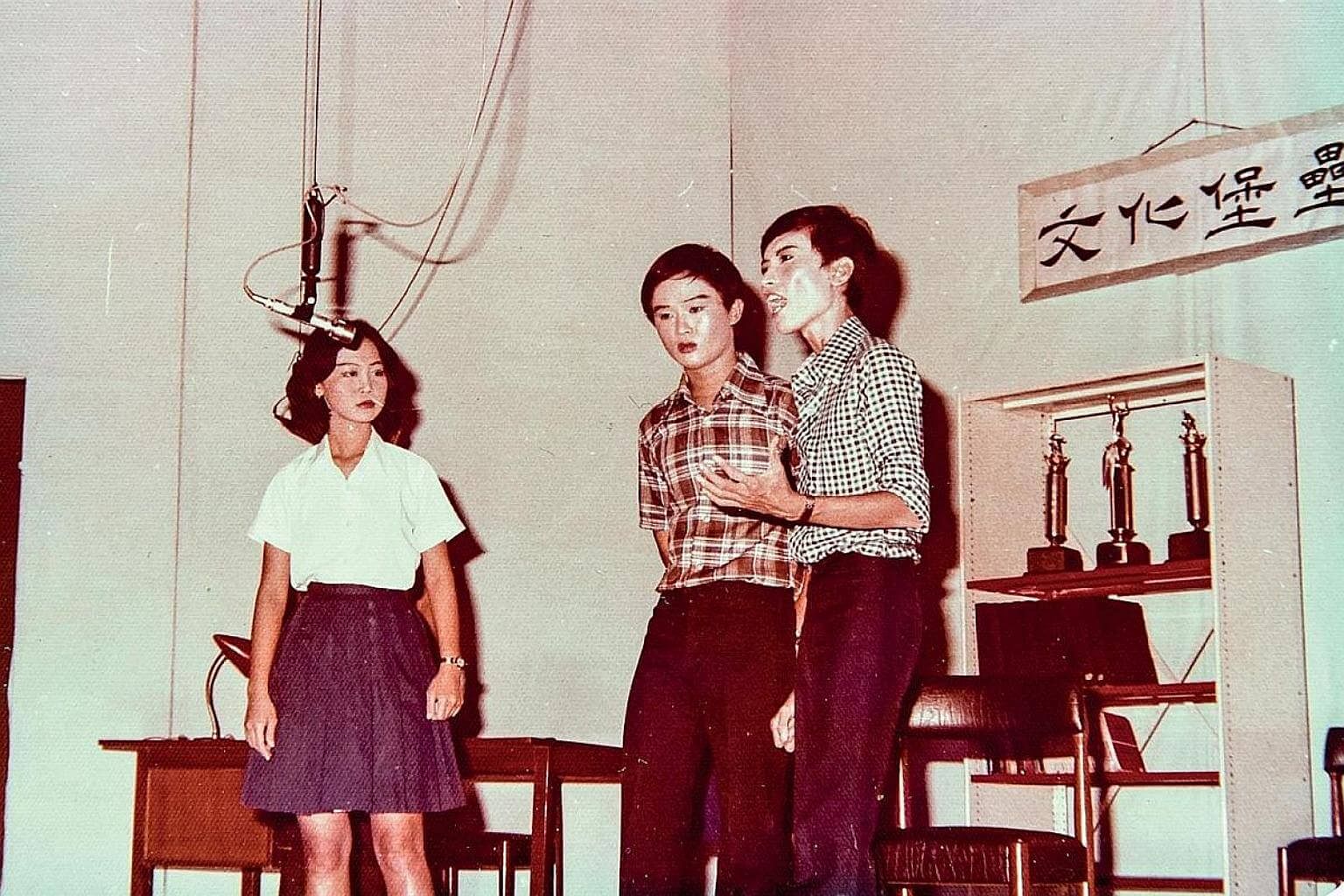-
BOOK IT / DIALOGUE WITH TIME - EMBRACE AGEING
-
WHERE: Hall B, Mezzanine, Science Centre Singapore, 15 Science Centre Road
WHEN: 10am to 6pm, daily (from next year, Science Centre Singapore will be closed on Mondays)
ADMISSION: Free (general admission to Science Centre Singapore applies)
The Life Interview With Lim Tit Meng
The Life Interview with Lim Tit Meng: Champion of science
Having made Science Centre Singapore come alive as a place of learning for all ages, the chief executive now looks to create a smart attraction that embraces technology

If you think the chief executive of Science Centre Singapore would be a nerdy fuddy-duddy, you would be wrong.
Associate Professor Lim Tit Meng is nothing like that.
In fact, the 57-year-old once wrote a musical titled Sex Cells, a cheeky dramatisation of reproduction to get young people learning about the birds and the bees using song and dance.
Performed in 2014 at the centre, the playful 35-minute show was just one of the many innovative ways in which the biology expert has made science fun.
Not one to shy away from sensitive topics, he says: "I want the Science Centre to be relevant to people from all walks of life, to engage them in a way that is meaningful to them."
This year marks the iconic institution's 40th anniversary and it is commemorating the occasion with a few blockbuster exhibitions, such as Dialogue With Time - Embrace Ageing, which is on the topic of ageing. Seeing the centre through this milestone is Dr Lim, who has been at its helm since 2010.

In his time, the National University of Singapore (NUS) biology professor has banished the idea of musty, dull showcases imparting knowledge and made science come alive.
Under his charge, the centre opened KidsSTOP, a 3,000 sq m attraction catering to children aged 18 months to eight years, where kids get to ride on a 7m-tall slide to be acquainted with gravity or learn about their physical make-up at a zone about the human body.
The popular attraction, dubbed, a "children's science centre", has been drawing 180,000 people yearly.
Another of his achievements is revamping the Singapore Science Festival, the biggest annual science event here.
For example, in the 2010s, a number of new programmes were initiated, such as the Singapore Mini Maker Faire and the Visual SG exhibition and forum. The Singapore Mini Maker Faire was a festival where inventors shared their creations with the public through exhibits, workshops and demonstrations.
Within a few years, the event grew to become a full-sized Maker Faire, and this year, it had more than 400 booths featuring virtual reality, robotics, technology and more.
In 2015, the Singapore Science Festival engaged more than 178,000 participants, from children to professionals.
On the centre's future direction, Dr Lim refers to a Chinese saying by famous philosopher Confucius-"si shi er bu huo", meaning that when one is 40, one should not be in doubt.
"I think the Science Centre has built a very strong and well-recognised brand. But today, with the Internet's growth and Singaporeans becoming more well-travelled, what is the Science Centre's relevance?
"We want to create a 'smart' Science Centre that embraces technology and have something to offer to everyone - from pre-schoolers to working professionals to the elderly."
Sex is part and parcel of science
Professor Andrew Wee, 55, vice-president for university and global relations at the NUS, has known Dr Lim since the 1980s. He says: "I'm not surprised Tit Meng has been credited with getting more young people to like science and visit the Science Centre. He has always championed science as an NUS faculty member and vice-dean.
"He remains young at heart and connects well with his audience. Being a committed father has also clearly helped."
The son of fishball hawkers, Dr Lim was named "meng" by his late father, from the Teochew phrase "cong meng", meaning "clever".
Explains Dr Lim: "After I was born, my father apparently looked at me and decided I had an 'intelligent' face. But he also feared I might grow up to be scheming and manipulative. So he also named me "tik" - eventually written as "tit" - meaning "straight" in Teochew.
"He hoped I would stick to the straight and narrow. So far in life, I have."
Even as a child - the fourth of five children - he was bright and inquisitive. He took an interest in nature and animals, which he had a lot of exposure to, from a young age.
Growing up in a rented room in Waterloo Street, he helped his parents clean and debone fish, which was later made into fishballs. At 10, after his family moved to a farm in Lim Chu Kang, he enjoyed running around with chickens and swimming in ponds with goslings.
He says: "In those days, I was surrounded by wildlife and animals. I could observe them, understand their behaviour and the way their bodies worked. It piqued my curiosity and, eventually, developed into my love for biology."
The academically inclined Dr Lim showed much promise in his early education at San Shan Primary, The Chinese High School and Hwa Chong Junior College.
Says Ms Goh Djong Hoa, 57, one of his former junior college schoolmates and now a vice-president of Chinese entertainment production at Mediacorp: "My strongest impression of him was that of a studious bookworm. But not many people know that he was also a performer and acted in a few productions by the Chinese literature, drama and debate society at school.

"When I invited him to appear as a guest scientist for the Channel 8 TV show Life Hacks last year, he brought along props to illustrate his points and his explanations were very clear."
One of the greatest challenges for the Chinese-educated Dr Lim was learning the English language. During his A levels, he did English as a second language and scored a B4.
He felt that to continue studying biology at the tertiary level, mastering English was a must. So after his full-time national service, he attended three months of English classes.
He later graduated from NUS with a bachelor's degree in zoology, as well as a doctorate in developmental biology from the University of Cambridge.
And although those classes were taught in English and Dr Lim can converse fluently in the language, he says: "I still think in Chinese. In fact, there were many English words that I learnt the meaning of only later in life."
He recalls, for example, how he conducted biology classes on the reproduction of sea urchins and asked students to look at the "cleavage" pattern - referring to the cell division of a fertilised egg - under a microscope.
He was unaware the word "cleavage" had a more commonly used, and sexually suggestive, meaning. He recalls: "Years later, I bumped into some former students, who said they remembered me as the lecturer who would always ask them to look at the 'cleavage' pattern."
Such misunderstandings do not bother him. To him, sex is not a taboo topic, but just another aspect of biology and science.
He met his wife, a biochemistry professor, during his time in Cambridge. They have a son, Jeremy, 26, and a daughter, Esther, 23.
And when it came to educating his children about the birds and the bees, he made sure they got the right information.
When his two children were in pre-school and primary school, he ran a kids' club with three other families with children of the same age. When his children were about 10, one parent, a medical doctor, conducted a session on sex education, explaining the human anatomy to the little ones.
When his son was 12, Dr Lim bought a book for him, which dealt with going through puberty.
Indeed, there is no topic he is unwilling to discuss. But his candour, and, by his own admission, sometimes inappropriate choice of words, have landed him in hot water before.
In 2014, he sent his staff an e-mail on International Women's Day - one of his weekly "love letters" - where he wrote "I have my reasons why not many women can have the stature to hold the highest position".
The e-mail got him nominated for an Alamak! Award for sexism by the Association of Women for Action and Research. In response, Dr Lim apologised unreservedly and emphasised that he meant no disrespect to women.
In an earlier interview addressing the issue, he told The Straits Times: "I am Chinese-educated, so I sometimes think in Chinese when I write. I could have been more careful in my choice of words and phrases."
Looking back, he adds: "I respect women very highly. In fact, growing up, I always regarded my elder sister, Deborah, as a hero because she was my mentor and she went to an English school. Her English was much better than mine. She is a retired teacher and, in a way, she inspired me to also become an educator."
Referring to another of Confucius' sayings, "wu ri san xing wu shen", he says: "Confucius tells us to reflect on ourselves three times a day. I have always done this.
"And where I fall short, I apologise and learn to do better. Even today, I am still learning."
Join ST's Telegram channel and get the latest breaking news delivered to you.
A version of this article appeared in the print edition of The Straits Times on November 20, 2017, with the headline The Life Interview with Lim Tit Meng: Champion of science. Subscribe

